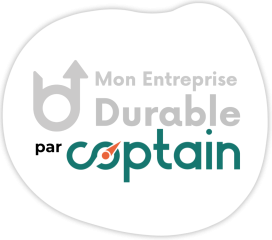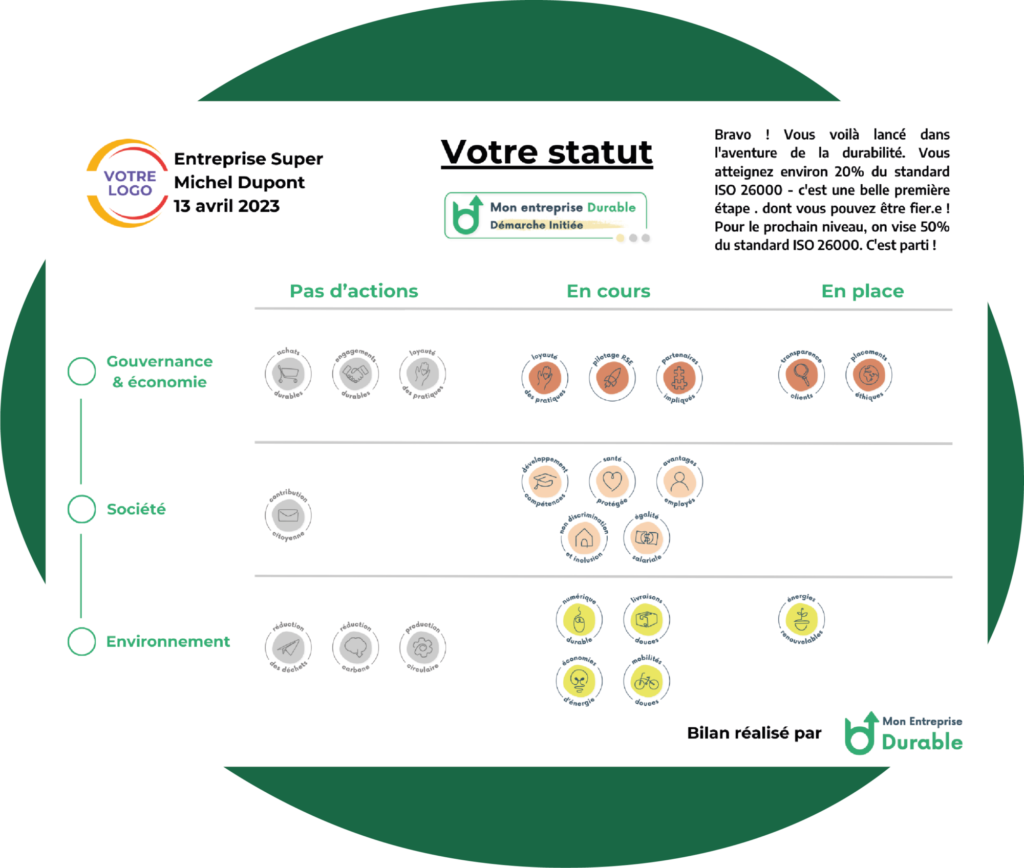Before you start reading
We divide the effort required for certification by 2 with the “My Sustainable Company” method. Talk to an advisor for an assessment of your situation with regard to obtaining the CSR certification.

Key points of the article
- The federal CSR framework
- A growing market for labels and certifications
- A blur of labels and certifications
- Labels or certifications: which route to take?
- The most suitable CSR certifications and standards in Switzerland
- How do you choose the right CSR certification or label for your company?
- Beyond size and business sector
- CSR trends in 2024: what impact will they have on your choices?
- CSR strategy maturity and available resources
- To conclude…
CSR may seem like a fad. On every street corner, a brand boasts of its responsible practices, and every company makes sustainable promises. But, faced with a veritable virgin forest of certifications and labels, how does one find one’s way around? This is where our journey begins.
The federal CSR framework
In 2021, the Swiss Confederation has reiterated its commitment to Corporate Social Responsibility (CSR) with 2020-2023 action plan. The objective is clear: to create an ecosystem of companies that not only look after the environment, but also take care of their employees, suppliers and customers. A chain of solidarity and respect, in which every link is necessary.
The acronym ESG – for Environment, Social, Governance – often accompanies CSR. It is particularly popular with financial players and large multinationals, serving as a compass for assessing a company’s sustainability performance. But, as any explorer knows, having a compass is not enough to avoid getting lost in the jungle.
A growing market for labels and certifications
At present, there are over a hundred labels in Switzerland, each claiming to light in the darkness of greenwashing. But for many, it’s difficult to discern what’s really behind these labels. The first step is to understand the difference between a label and a certification. A label is a mark, a simple stamp indicating that a structure complies with certain specifications. Certification, on the other hand, implies a deeper commitment, a promise of lasting quality and continuous improvement over time.
A blur of labels and certifications
In this jungle, the tangle of labels and certifications has generated a confusion that undermines their credibility. This proliferation often leaves companies at a loss. A carpenter can hardly do without the FSC label if he wants to prove that his wood comes from sustainably managed forests. But what about other sectors?
Embarking on a certification process is more than just a formality: it’s a genuine strategic choice. Certification offers a regular assessment, an in-depth analysis that becomes a valuable source of information. And today, the criteria are expanding to include concepts such as the circular economy and digital data protection.
Your goal is to obtain a certification ? Put your trust in a company that received CSR certification in 2024. We also hold the Eco-Entreprise label, B Corp or Ecovadis.
Labels or certifications: which route to take?
Faced with so many options, how do you know which one is right for your company? There are three main families: global certifications (such as EcoEntreprise or B Corp), specific certifications (ISO 9001, ISO 14001, etc.), and sector-specific certifications, tailored to particular industries such as food or health. We’ll guide you through each certification and label.
The most suitable CSR certifications and standards in Switzerland
EcoEntreprise: the benchmark Swiss label
The EcoEntreprise label label is the benchmark for Swiss companies wishing to demonstrate their commitment to corporate social responsibility. Designed specifically for the Swiss contextEcoEntreprise is based on the guiding principles of ISO 26000, but is distinguished by its formal certification nature. It evaluates companies according to several criteria, including environmental management, social responsibility and corporate governance. By obtaining this label, your company benefits from national recognition and positions itself as a player committed to sustainable practices. EcoEntreprise is particularly well suited to companies wishing to strengthen their local credibility and gain access to new partnerships and markets in Switzerland.
B Corp: for a global, transparent commitment
B Corp certification is an international standard that rigorously assesses a company’s social, environmental and governance performance. Achieving B Corp certification means that your company is committed to responsible practices worldwide. Certification is therefore ideal for Swiss companies wishing to enhance their international reputation by demonstrating a transparent commitment to sustainability, thereby attracting customers and investors sensitive to social and environmental issues.
EcoVadis: multi-criteria evaluation
EcoVadis offers a comprehensive assessment of corporate social responsibility (CSR), analyzing several key dimensions such as the environment, working conditions and business ethics. Thanks to its flexible methodology, EcoVadis enables companies of all sizes to identify the strengths and weaknesses of their CSR practices. This assessment helps organizations to make progress, while reinforcing their credibility with stakeholders. However, an EcoVadis assessment can entail significant costs, particularly for small and medium-sized companies, depending on the size and complexity of the analysis required. This certification is particularly useful for B2B companies, if your customers value it in their calls for tenders.
ISO 14001: for effective environmental management
ISO 14001 is a certifiable international standard that helps companies structure their environmental management. By adopting this standard, organizations commit to identifying, controlling and reducing their environmental impacts, while integrating these practices into their day-to-day operations. This standard is particularly advantageous for companies seeking to comply with environmental regulations while optimizing their management of environmental risks. However, ISO 14001 focuses exclusively on the environmental dimension of corporate social responsibility (CSR), leaving out the social and ethical aspects, which may require the adoption of other standards for a more comprehensive CSR approach. It is particularly suited to companies with a high environmental impact.
Fairtrade: for fair trade
Fairtrade certification certification is dedicated to fair trade and guarantees that products come from production chains that respect fair working conditions and sustainable environmental practices. This label is particularly relevant to Swiss companies operating in the consumer products sector. By obtaining this certification, you can demonstrate a concrete commitment to ethical trade, responding to growing consumer demand for products derived from fair and sustainable practices.
Regional CSR labels
Vaud Certifié d’ici and Vaud Ambassadeur: A regional award for companies of excellence
The Vaud Certifié d’ici label and Vaud Ambassadeur are examples of territorial branding aimed at recognizing and promoting businesses of excellence in the canton of Vaud. Vaud certifié d’ici is aimed primarily at local producers and craftsmen who wish to promote their know-how and guarantee the Vaud origin of their products, while Vaud Ambassadeur is aimed at companies who wish to promote their attachment to the canton of Vaud and their contribution to the region’s influence on a national and/or international scale. Although these labels do not focus specifically on sustainability criteria, they do highlight companies that stand out for their overall performance. By obtaining Vaud Certifié d’ici or Vaud Ambassadeur, Vaud companies affirm their commitment to high standards of quality and responsibility. These labels offer increased visibility and can open up new business opportunities for local companies. They are particularly beneficial for Vaud companies seeking to strengthen their position in the regional market and attract new customers and partners.
Carbon Fri: a regional climate commitment
The Carbon Fri label is an initiative that reflects the commitment of companies in the canton of Fribourg to reducing their carbon footprint. Created in 2018, the label encourages local SMEs to reduce their CO2 emissions while contributing to a regional fund dedicated to sustainable projects. By obtaining the Carbon Fri label, Fribourg companies not only demonstrate their environmental responsibility; they also support local initiatives. This label is an excellent opportunity for companies in Fribourg to demonstrate a concrete commitment to reducing emissions and to position themselves as responsible players in the fight against climate change.
Valais Excellence: local distinction for sustainable excellence
The Valais Excellence is distinguished by its aim of promoting Valais companies that combine operational excellence with social commitment. It certifies organizations that demonstrate continuous improvement in their products and services, while respecting high sustainability criteria. This label is a strong sign of seriousness and commitment to ethical and responsible practices. For Valais companies, obtaining the Valais Excellence label represents not only a competitive advantage, but also recognition of their positive contribution to the community and the environment. This label is particularly well suited to companies wishing to stand out in a regional market by highlighting their performance and commitment.
How do you choose the right CSR certification or label for your company?
The choice of the most appropriate CSR certification depends on several key factors. First of all, it’s important to check the strategic alignment of the certification with your business objectives. For example, if your aim is to enhance your reputation at national level, the EcoEntreprise label may be the most appropriate, while if you wish to achieve international recognition, B Corp certification will be more relevant. Next, consider your company’s sector of activity, as some certifications are more relevant to specific sectors. For example, companies with a strong environmental component may find ISO 14001 particularly useful.
Also assess the resources required to obtain and maintain certification, as some certifications, such as B Corp, can require a significant commitment of time and resources. Finally, choose a certification that is widely recognized in your target market to maximize return on investment.
Beyond size and business sector
The choice of CSR certification for a company is not limited to criteria of size or sector, but must respond to deeper and more diverse aspirations. For a company seeking to act primarily on a local level, regional certifications such as Carbon Fri and Valais Excellence offer the opportunity to support concrete initiatives within the community. They embody a tangible commitment to emissions reduction or sustainable excellence, while enhancing local reputation.
When the aim is to have a broader impact, at national level, the EcoEntreprise label proves relevant. It embodies a solid commitment specific to Swiss realities, by rigorously assessing environmental and societal practices according to ISO 26000 standards. The label is designed to help companies stand out in the Swiss market through an integrated approach to CSR.
For companies seeking recognition beyond their borders, B Corp certification is a strategic choice. It offers international validation by assessing social, environmental and governance performance, and demands a high level of commitment. This certification is particularly valued by investors and consumers seeking to support transparent, truly responsible companies.
Finally, the growing expectations of stakeholders play a key role in the choice of certification. Consumers prefer companies committed to ethical practices, investors seek tangible proof of responsibility, and regulators impose strict standards. B Corp certification meets these global expectations, while ISO 14001 ensures rigorous compliance with environmental regulations, helping companies to navigate a complex landscape of social responsibility.
CSR trends in 2024: what impact will they have on your choices?
In 2024, CSR requirements will become more stringent, in particular with the introduction of the CSRD directive in the European Unionwhich requires reporting on sustainability issues. To remain competitive and meet the growing expectations of your business partners, it is crucial to choose a recognized certification that simplifies their own reporting obligations. If your customers are multinationals, EcoVadis or B Corp certifications are essential to reinforce your international credibility. For French and Swiss customers, EcoEntreprise, recognized via the Responsibility Europe label, is an excellent option. Obtaining these certifications is an in-depth process that requires commitment, but it will position you favorably in an increasingly demanding market. Turn these obligations into competitive advantages and prepare your company to meet new demands while contributing to a sustainable future.
CSR strategy maturity and available resources
In addition to the matrix of impact, commitment and stakeholder expectations, we need to consider the maturity of the company’s CSR strategy and the resources available for the certification process. CSR strategy maturity refers to the level of development and integration of sustainable practices within the company. For companies whose CSR strategy is still in the start-up phase, less demanding certifications can offer a solid starting point. Labels such as Vaud+, which focus on general excellence without specific sustainability criteria, can help build a foundation for responsibility while enhancing the company’s image at a regional level. As the CSR strategy becomes stronger and more formalized, more advanced certifications, such as ISO 14001 or B Corp, can be considered to push commitment towards higher standards and greater recognition.
Available resources are a determining factor in the choice of certification. Obtaining certain certifications requires significant investment in terms of time, finances and human resources. Companies need to assess whether they have the necessary resources to meet the requirements of more demanding certifications. For example, obtaining B Corp certification involves a rigorous process and an ongoing commitment to transparency and improved practices. For companies with limited resources, starting with basic certifications such as those tailored to regional commitments or less complex environmental management standards may be a more realistic approach. As the company’s capabilities and resources develop, it can then consider more ambitious certifications that require greater involvement.
To guide you, diagnostic tools such as Benchmark for the Future allow you to assess, in 60 questions, where your company stands in terms of sustainability. Quick and easy ways to get an initial assessment before diving into more complex procedures.
To conclude...
Navigating this jungle of labels and certifications may seem daunting, but it’s a virtual must for any company wishing to demonstrate its commitment to sustainability. Whether you choose a label or a certification, the important thing is to remain consistent with your company’s values and aim for continuous improvement. The road is long, but it’s worth the effort. After all, the future of our planet is at stake.
You don’t know where to start your CSR approach ? Take action and build your action plan with our experts





